Reputation marketing is not about collecting reviews. It is about converting trust into revenue.
Most businesses stop at monitoring ratings. The smarter ones turn customer praise into visibility, credibility, and demand across every channel. Reviews influence search results, shape buying decisions, and determine who gets shortlisted. If you are not actively promoting your reputation, you are underutilizing your strongest marketing asset.
Summary:
Reputation marketing transforms customer feedback into measurable growth. This guide breaks down strategy, real examples, and execution frameworks that help multi-location businesses amplify trust at scale.
Table of contents
- What is reputation marketing?
- Reputation marketing vs. reputation management
- Importance of reputation marketing for multi-location businesses
- Reputation marketing components every business must focus on
- How to build a successful reputation marketing strategy? 3 critical steps to follow
- Top 9 reputation marketing examples to inspire your strategies
- How to measure reputation marketing efforts
- Reputation marketing software: Key to a stronger, consistent, positive online reputation
- Frequently asked questions about reputation marketing
- Birdeye – One-stop solution to market your reputation across multiple channels
What is reputation marketing?
Reputation marketing is the proactive process of promoting a business’s positive reputation to attract more potential customers, increase conversion rates, and build long-term brand value.
Reputation marketing goes beyond the reactive approach of simply handling negative reviews. It focuses on using positive reviews, customer testimonials, and user-generated content across social media, websites, ads, and other marketing channels to amplify a brand’s credibility.
“Brands are not in control anymore of how they’re marketing. If you look at any marketing channel, there are ways for people to avoid it, and that’s what they want. Consumers are going through private or niche communities, text messages, stories, and groups. People choose communities they trust where they’re asking for advice and sharing referrals. If a brand wants to exist and be known, they have to get invited to those conversations. Unless someone has left their community with positive information based on their positive experience with a business, there’s no way to buy your way into the community.”
Jessika Phillips, NOW Marketing Group
Reputation marketing vs. reputation management
While often used interchangeably, reputation marketing and reputation management serve very different purposes. Reputation management is reactive and centers around monitoring your online reviews, responding to negative feedback, and trying to limit damage when something goes wrong.
On the other hand, reputation marketing is proactive. It focuses on showcasing your positive reputation to drive trust, visibility, and customer loyalty.
Here’s how they compare across a few critical aspects:
| Aspect | Reputation Management | Reputation Marketing |
| Primary Goal | Mitigate damage, resolve complaints | Promote trust, attract new customers |
| Approach | Reactive | Proactive |
| Focus Areas | Responding to negative reviews, crisis control | Highlighting positive reviews, UGC, and social proof |
| Channels Used | Review sites, internal systems | Social media, website, ads, listings, email campaigns |
| Outcome | Maintain brand integrity | Grow brand visibility, improve conversions |
| Measurement | Star rating, sentiment, response time | Review volume, share of voice, CTRs, and customer engagement |
| Example Activity | Responding to a 1-star complaint | Resharing a glowing Google review on Instagram |
Pro Tip: A successful reputation marketing strategy always starts with strong reputation management, but doesn’t stop there. It amplifies positive brand content to maximize the impact of every great customer interaction.
Importance of reputation marketing for multi-location businesses
With reputation marketing strategies, businesses can build trust in the local and global markets, display social proof, improve conversion rates, outperform competitors, and boost the overall brand value.
Investing in reputation marketing ensures that the efforts put into reputation management and building a positive brand perception reap rewards for the business across locations.

Let’s explore why it matters so much for multi-location growth:
- Build trust – Most consumers trust online reviews as much as personal recommendations. Your business can earn trust faster by promoting positive reviews and real customer experiences across search engines, websites, and social media platforms.
- Display social proof: People don’t just want to hear what you say about your brand; they want to hear what others say. Therefore, reposting user-generated content like reviews, photos, and ratings gives your brand authenticity and credibility at scale.
- Boost customer loyalty & employee morale: Sharing positive feedback in marketing reinforces loyalty among existing customers. It also boosts team morale, especially in franchise models, by recognizing great service and team wins publicly.
- Improve conversion and retention rates: Promoting positive brand content at key touchpoints on landing pages, emails, or local ads drives conversions and reduces churn. Customers who feel valued and see consistent social proof are more likely to stick around.
- Outperform competitors: Brands with a stronger online reputation and higher review volume stand out in search results and buyer comparisons. In crowded markets, perceived credibility beats price and even convenience.
- Boost brand value to become a premium player: A strong brand’s reputation contributes directly to brand equity and pricing power. Multi-location brands with high reputation scores can command higher prices, attract better talent, and close deals faster—because they’re seen as leaders, not just options.
Why Search AI changes reputation marketing
Reputation marketing no longer ends at social posts or website widgets. It now influences how generative search platforms describe and recommend your brand.
When customers ask AI engines detailed questions such as “best pediatric dentist near me with great reviews” or “most trusted HVAC company in Dallas,” those systems summarize reviews, evaluate sentiment, and compare competitors before showing results.
Birdeye Search AI helps businesses:
- Measure how often their locations appear in AI-generated answers
- Analyze whether AI describes the brand positively or negatively
- Identify which review sites and listings AI platforms rely on
- Fix visibility gaps by improving listings, reviews, and content accuracy
- Ensure business information is correct across emerging search platforms
Reputation marketing today includes shaping how intelligent search systems interpret your brand. If your reputation is not optimized for that layer, competitors will control the narrative.
Reputation marketing components every business must focus on
A successful reputation marketing strategy isn’t built on reviews alone. It’s a combination of every place your brand shows up online and every channel where customers interact with or talk about you. Each of these components must work together to amplify your positive reputation consistently across geographies, channels, and touchpoints.
Here are the key elements that power effective reputation marketing efforts:
- Customer feedback channels like surveys, SMS replies, and webchat aren’t just service tools; they’re content sources. Gathering and spotlighting positive feedback helps prevent churn, uncover local issues, and maintain a positive reputation enterprise-wide.
- Online reviews influence both consumer trust and search engine optimization (SEO), especially when recent and high-quality. Promoting positive reviews across channels boosts visibility, credibility, and conversion, especially across multiple locations where consistency matters.
- Your SERP presence is a public scorecard, and optimizing SERPs with review snippets, blog content, and thought leadership ensures positive brand content appears before outdated or negative reviews.
- Accurate local listings build trust and improve local discoverability. Using reputation marketing software to manage your NAP details across Google, Yelp, Facebook, and others helps avoid confusion and reduces negative feedback from outdated info.
- Your social media platforms are where your reputation changes in real time. Engaging with social media comments, resharing user-generated content, and promoting customer success stories turn each post into a trust-building moment. Quick responses also help prevent negative feedback.
- Customer feedback channels like surveys, SMS replies, and webchat aren’t just service tools; they’re content sources. Gathering and spotlighting positive feedback helps prevent churn, uncover local issues, and maintain a positive reputation enterprise-wide.
How to build a successful reputation marketing strategy? 3 critical steps to follow
A great reputation doesn’t just happen; it’s built strategically and maintained continuously. For multi-location businesses, building an effective reputation marketing strategy means going beyond surface-level tactics and operationalizing the process across every touchpoint, channel, and region.
Here’s how to build a scalable and consistent strategy from the ground up:
Identify user-generated content and reviews to promote
The heart of reputation marketing lies in promoting your existing customer stories. Identify positive reviews, social mentions, tagged photos, and testimonial videos you can amplify across social media platforms, email campaigns, and landing pages.
Focus especially on:
- High-impact reviews that mention specific products, services, or team members.
- Visual UGC (photos, videos) tied to specific locations.
- Quotes that reflect your brand values or customer satisfaction.
Promoting positive user-generated content builds authenticity and encourages more customers to contribute.
Automate review collection and user-generated content
Manual review collection doesn’t scale. Use automation tools to request reviews via email and SMS after key moments (like a purchase or appointment). You can also automate requests to customers to tag your business in social posts or submit feedback through surveys.
Develop a content marketing strategy to support reputation marketing
Your reputation marketing strategy must align with broader marketing efforts. Use customer stories and reviews as the foundation for blogs, landing page copy, newsletters, videos, and social media posts. This approach humanizes your brand and transforms marketing materials into trust-building tools.
Here are some reputation marketing examples via content:
- Repurpose 5-star reviews into Instagram carousels or testimonial reels.
- Use customer feedback in product updates or campaign messaging.
- Integrate review quotes directly on service pages.
- Develop thought-leadership content that builds on what people say in reviews and social media mentions.
Top 9 reputation marketing examples to inspire your strategies
Once your foundation is in place, it’s time to scale. A truly effective reputation marketing strategy doesn’t rely on one or two tactics—it’s an ongoing system that turns every positive review, mention, or experience into a marketing asset.
Below are the most impactful strategies to amplify your brand’s reputation across all locations and channels:
Automate the resharing of positive reviews and testimonials
Use reputation marketing software to automatically reshare positive customer reviews on your website, email newsletters, and social media platforms. For example, Birdeye lets you set rules to auto-post new 5-star reviews from Google or Facebook to specific location pages or branded profiles.
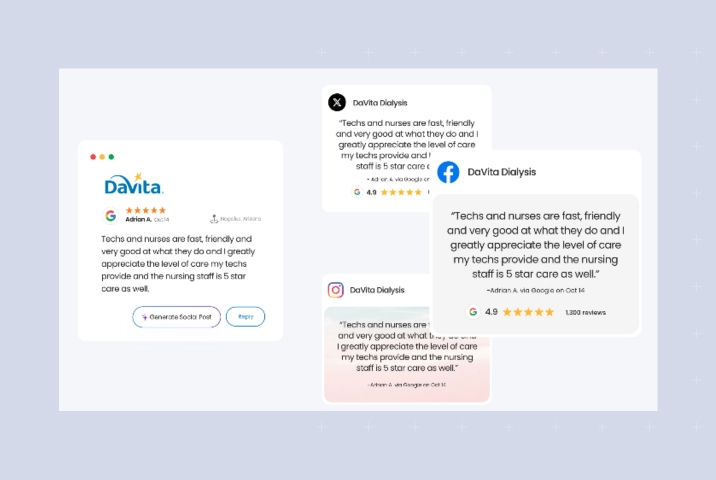
This reinforces your positive online reputation and ensures that glowing feedback never goes unnoticed or underutilized.
Add a review widget to your website
Placing a dynamic review widget on your homepage or service pages helps influence consumer perception at the moment of decision. It showcases your most recent and highest-rated online reviews, driving both SEO benefits and conversion improvements.

Customers are far more likely to convert when they see authentic proof that others trust your business.
Engage with your audience on social media
Every business must follow the philosophy of “don’t just broadcast, respond.” Acknowledging social media comments, reposting customer stories, and answering questions in real time helps manage brand reputation while building meaningful relationships.

This kind of engagement turns passive followers into active promoters and helps prevent negative feedback from festering.
Repost user-generated content
When customers tag your business or post positive experiences, reshare that user-generated content with credit. This shows that you value your community and trust them to help tell your story.
UGC is far more trusted than brand-generated posts, making it a powerful part of any reputation marketing playbook.
Focus on building a cohesive brand identity online
Consistency is key, especially for multi-location businesses. Your tone, visuals, and messaging across social media accounts, listings, and ads must reflect a unified brand stand. That’s how customers begin to associate trust and professionalism with your brand marketing.

A strong and positive image starts with eliminating fragmentation across platforms.
Ensure consistency in local listings and directories
Optimize and sync your business information across online review sites, Google, Apple Maps, Yelp, and other directories. Inconsistent data leads to frustration and lost opportunities.
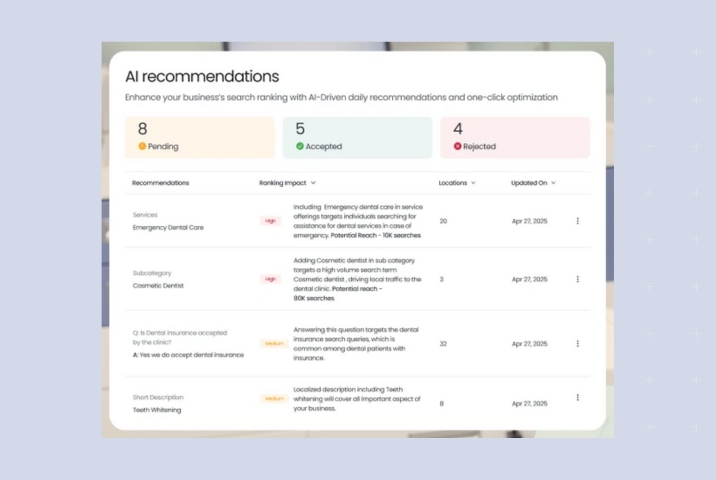
Search engines reward accurate and complete listings, making this a crucial search engine optimization and online reputation marketing strategy.
Provide a superior customer experience
No reputation marketing can succeed if your service disappoints. Train staff to resolve issues quickly, respond to reviews, and go the extra mile. Encourage positive feedback by creating moments worth sharing.
A 5-star experience is still the best marketing you can’t buy.
Post thought leadership content
Publishing expert content, customer success stories, and trend commentary elevates your brand and influences consumer perception. It complements your positive brand content and differentiates you from competitors.
It also earns backlinks, improves search engine optimization, and builds long-term brand trust.
Connect with influencers with a solid reputation
Partner with creators or industry influencers whose values align with your brand’s image. They can help amplify your story through social media posts, shoutouts, and user experiences, especially for local campaigns.
This extends your reach while reinforcing credibility, especially in new markets.
How to measure reputation marketing efforts
You can’t improve what you don’t measure. The success of your reputation marketing efforts depends on tracking the right metrics across locations, platforms, and channels. For multi-location businesses, this means going beyond vanity metrics and focusing on signals that reflect customer satisfaction, visibility, and brand sentiment.
Here’s how to evaluate the health and impact of your reputation marketing strategy:
Brand sentiment analysis
Understanding how customers feel about your brand is just as important as how many stars you’ve earned. Use AI-powered tools to analyze review tone, social media comments, and customer feedback across locations to identify patterns and surface emerging issues.
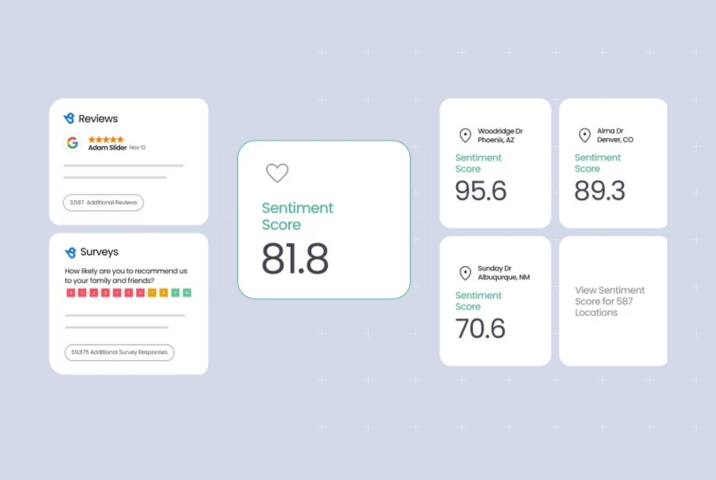
Tracking sentiment helps you strengthen your positive reputation and quickly address areas of concern before they escalate.
Reputation score
Platforms like Birdeye offer a proprietary reputation score that factors in online reviews, ratings, response time, and listing accuracy across every location. This helps you benchmark performance over time and compare locations or regions.
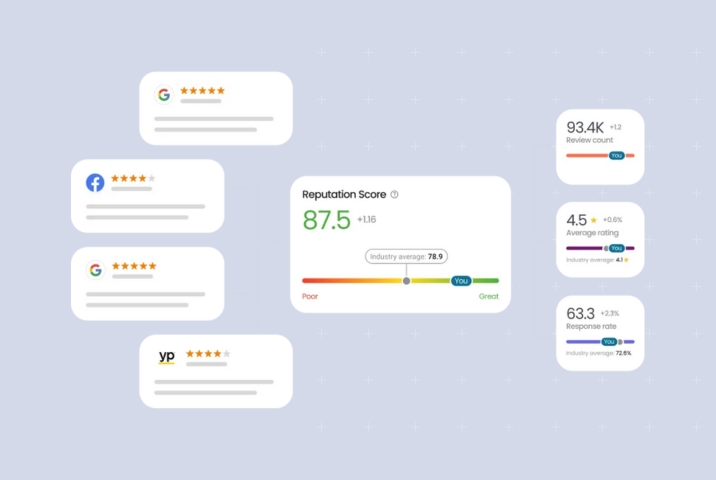
A unified score provides a high-level view of your brand’s reputation, helping teams stay aligned and accountable.
Review volume and ratings
Track how many reviews you receive each week, where they’re coming from (Google, Facebook, etc.), and what the average rating is per location. Review frequency and quality influence your presence in search engines and directly impact search engine optimization.

A steady stream of positive reviews signals to both customers and algorithms that your business is active, relevant, and trustworthy.
Make your reputation market your business
Want to see the impact of Birdeye on your business? Watch the Free Demo Now.
Social media monitoring
Measure engagement across social media platforms, likes, shares, comments, mentions, and monitor sentiment in social media posts. Pay attention to tagged content and location-specific interactions.
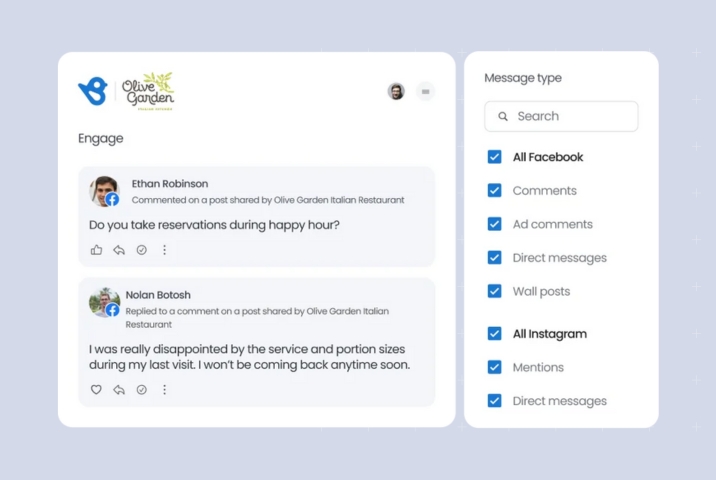
This gives insight into how your brand’s image is perceived in real time and where more reputation marketing investment is needed.
Direct customer surveys
Surveys help fill the gap between public reviews and private concerns. Use them to collect customer feedback post-visit or post-purchase. These insights can fuel operational improvements and uncover new marketing materials or testimonial opportunities.

It’s one of the best ways to prevent negative feedback from turning into negative reviews.
Reputation marketing software: Key to a stronger, consistent, positive online reputation
To scale your reputation marketing efforts, the right software is essential, especially for multi-location operations. Here’s what the best tools empower you to do:
- Automate review generation: Sends review requests via email or SMS after purchases or visits to ensure a steady flow of positive customer reviews and reduce manual follow-up.
- Centralized reputation insights: Tracks online reviews, sentiment, and ratings across platforms and locations in a single dashboard, giving teams a unified view of the brand’s reputation.
- Amplify positive content: Automatically reshares 5-star reviews as social media posts, embed widgets on your website, and fuel your positive online reputation across touchpoints.
- Respond from one inbox: Manages reviews, messages, and social media comments in one place. AI-powered replies ensure fast, consistent engagement without the workload.
- Analyze performance: Monitors sentiment, customer satisfaction, and review trends to see what’s working and where to improve your reputation marketing strategy.
“Before Birdeye, many of our clients had difficulty gathering customer experiences and sharing them. Birdeye has enabled us to put in place a systematic way to aggregate customer reviews on a regular, cost-effective basis… moreover, to have an optimized page of client reviews from various review sites is invaluable… we love it!”
Anthony J Vela Jr., DRH Inc.
Conclusion
Your reputation can be a driving force behind your marketing success. For multi-location enterprises, reputation marketing offers a strategic, scalable way to control your brand’s image, amplify your best customer stories, and turn every interaction into a growth opportunity. By integrating reviews, social proof, and automation into your marketing efforts, you’re not just protecting your brand—you’re proactively building its value.
Frequently asked questions about reputation marketing
Not at all. Both new and established businesses can use reputation marketing to build trust, increase visibility, and leverage a positive online reputation to compete. New brands often see fast growth by showcasing early positive reviews.
It depends on your review volume, existing brand sentiment, and how aggressively you collect and promote positive reviews. Most companies begin to see improved search engine results and increased conversion rates within 3–6 months of consistently launching reputation marketing efforts.
Yes. Promoting positive brand content like review widgets, starred snippets, and customer testimonials helps improve your search engine results, boost click‑through rates, and enhance local search engine optimization. This increases visibility and drives more organic traffic to your site.
Very effective. User-generated content and word-of-mouth marketing are often more trusted than ads. UGC posts see significantly higher engagement and often influence new customers more than brand-created content.
Birdeye – One-stop solution to market your reputation across multiple channels
Birdeye is more than just a review platform; it’s a complete reputation marketing software built for multi-location businesses that want to turn their online reputation into a competitive advantage.
With Birdeye, you can:
- Collect more positive reviews automatically with Birdeye Reviews: Send review requests via SMS and email at the right moments to drive positive feedback and improve visibility across online review sites.
- Optimize listings for better search visibility with Birdeye Listings: Ensure every location is accurate and up-to-date across Google, Apple Maps, Yelp, and 150+ directories—critical for local SEO and brand trust.
- Respond faster and engage better using Birdeye Messaging: Centralize reviews, texts, chats, and social media comments into one unified inbox. Plus, leverage AI to respond at scale.
- Amplify your best content across channels with Birdeye Social: Turn positive reviews and user-generated content into branded social media posts, scheduled and published across all your pages.
- Uncover insights and improve experience with Birdeye Surveys & Insights AI: Gather direct customer feedback, analyze sentiment, and identify trends to build a positive reputation enterprise-wide.
Ready to stop managing and start marketing your reputation?
Watch a free demo to see how Birdeye can help your business grow with less effort and more impact.

Originally published









